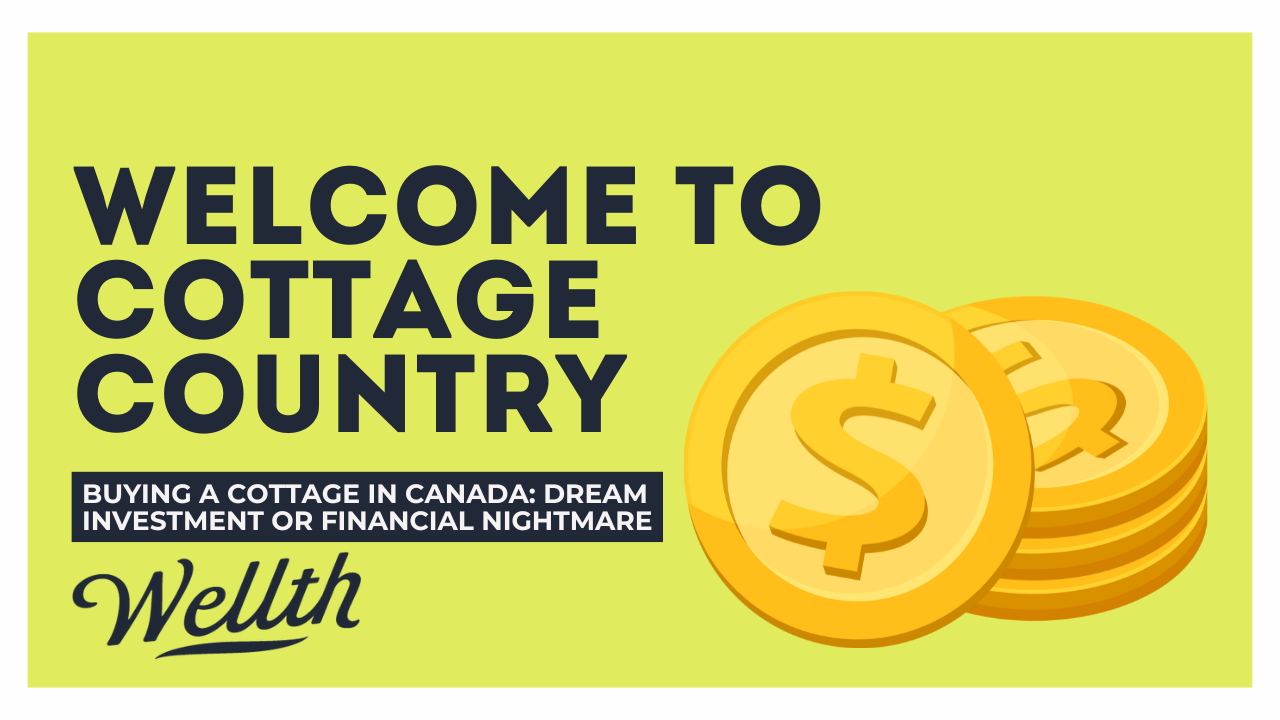Buying a Cottage in Canada: Dream Investment or Financial Nightmare?
The romantic getaway you've always wanted might be the money pit you never saw coming. Here's how to run the numbers—and the lifestyle test—before signing that offer.
Welcome to Cottage Country—Now Open Your Wallet
Cottages aren’t just a Canadian summer dream—they’re practically a rite of passage. Muskoka chairs. Fire pits. Jumping off the dock at sunset.
But beneath the charm of lakeside living lies a financial iceberg. Between rising interest rates, insurance surprises, property taxes, and unpredictable rental income, the decision to buy a cottage is no longer a no-brainer.
In this edition of Wellth, we break down how to evaluate a cottage purchase through the lens of both lifestyle and long-term financial health. Whether you're eyeing Haliburton, the Okanagan, or Prince Edward County, read this before making an offer.
🧠 Key Takeaways:
Cottages are not passive investments—they require active time, money, and risk tolerance.
Financing is tougher than for primary homes—expect higher rates and stricter terms.
Short-term rental income isn’t guaranteed—and comes with tax and regulation headaches.
Consider co-ownership, fractional ownership, or renting as alternatives.
1. The Lifestyle Filter: Want vs. Need
Before you open Realtor.ca, ask: Is this for investment, lifestyle, or both?
If it's purely for relaxation and memory-making, that’s valid. Just don’t mask a want as a wealth strategy.
🏖 Considerations:
How often will you realistically use it?
Are you comfortable maintaining two properties?
Will it become a source of stress (e.g. snow removal, pipe freezes, septic issues)?
Pro tip: Rent a cottage in the same region for a season. Track your costs and experience. If it still feels right, move forward.
2. Financing: It's Not Like Buying Your House
Most major lenders treat recreational properties as riskier than primary residences. Here’s why that matters:
💰 Expect:
20% minimum down payment (sometimes more)
Higher interest rates (especially for 3-season properties or those without year-round access)
CMHC mortgage insurance? Not available for second homes
And if the property doesn’t have basics like potable water or year-round road access? You may need a private lender.
🔗 Compare recreational mortgage options from RBC
3. Ongoing Costs: The Cottage Tax You Didn’t Expect
Let’s break down what most cottage buyers overlook:
CostEstimated Annual Amount
Property Taxes $2,500–$5,000+
Maintenance (dock, septic, roof) $2,000–$8,000+
Insurance (higher for rural) $1,500–$4,000+
Utilities (propane, hydro) $1,000–$3,000
Travel (fuel, repairs)Varies, easily $1,500/year
Add all that up? You're looking at $10,000–$20,000 annually before any mortgage payments.
4. Can You Actually Make Money?
Yes, some people Airbnb their way to covering all costs and even earning income. But there are catches:
📉 What to Watch Out For:
Local restrictions: Many towns (e.g., Wasaga Beach, Kelowna) are clamping down on short-term rentals.
Seasonality: In Ontario, prime rental months are only June–August.
Wear and tear: Guests aren’t always gentle on your place.
Tax implications: CRA considers rental income taxable and may limit principal residence exemptions if mixed use.
If your ROI depends on 90%+ occupancy, rethink the strategy.
5. The Exit Plan: Is It Easy to Sell?
Some regions are hot—others, not. Cottages in Muskoka, for example, may still hold value due to legacy appeal and scarcity. But go two hours farther north? Liquidity can vanish.
🏡 Ask these before buying:
Is the lake desirable? (size, clarity, boat access)
Is the lot flat and accessible?
Are year-round services available?
Are nearby homes maintained or derelict?
Your exit should never depend on a "greater fool" theory.
6. Alternatives: Other Ways to Cottage (Without the Commitment)
You don’t have to go all-in to enjoy cottage life.
Try these instead:
Seasonal rentals: Book 4–6 weekends a year in different areas for variety.
Co-ownership: Split purchase with family or friends (but get a legal agreement).
Fractional ownership: Buy weeks, not the whole thing (see: Luxury Fractional Guide).
Cottage REITs or ETFs: Exposure to cottage-country real estate without a second mortgage. (Example: SOT.UN – Slate Office REIT with mixed exposure)
Final Thoughts: Buy the Lifestyle, Not the Headache
A cottage can be a magical escape. It can also become your most expensive mistake.
The smartest move? Run the numbers like an investor, and check your heart like a therapist. If it passes both tests, welcome to dock life.
If not?
You're one Airbnb search away from sipping wine on the same dock—without the upkeep.
Disclaimer: This analysis is for informational purposes only and does not constitute financial advice. Investors should conduct their own due diligence and consult with a financial advisor before making investment decisions.


